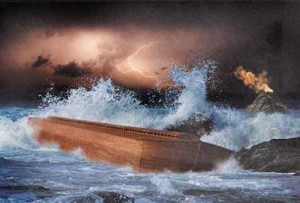Then the Lord said to Noah, ‘Go into the ark, you and all your household, for I have seen that you alone are righteous before me in this generation. Take with you seven pairs of all clean animals, the male and its mate; and a pair of the animals that are not clean, the male and its mate; and seven pairs of the birds of the air also, male and female, to keep their kind alive on the face of all the earth. For in seven days I will send rain on the earth for forty days and forty nights; and every living thing that I have made I will blot out from the face of the ground.’ And Noah did all that the Lord had commanded him.
Noah was six hundred years old when the flood of waters came on the earth. And Noah with his sons and his wife and his sons’ wives went into the ark to escape the waters of the flood. Of clean animals, and of animals that are not clean, and of birds, and of everything that creeps on the ground, two and two, male and female, went into the ark with Noah, as God had commanded Noah. And after seven days the waters of the flood came on the earth.
In the six-hundredth year of Noah’s life, in the second month, on the seventeenth day of the month, on that day all the fountains of the great deep burst forth, and the windows of the heavens were opened. The rain fell on the earth for forty days and forty nights. On the very same day Noah with his sons, Shem and Ham and Japheth, and Noah’s wife and the three wives of his sons, entered the ark, they and every wild animal of every kind, and all domestic animals of every kind, and every creeping thing that creeps on the earth, and every bird of every kind—every bird, every winged creature. They went into the ark with Noah, two and two of all flesh in which there was the breath of life. And those that entered, male and female of all flesh, went in as God had commanded him; and the Lord shut him in.
The flood continued for forty days on the earth; and the waters increased, and bore up the ark, and it rose high above the earth. The waters swelled and increased greatly on the earth; and the ark floated on the face of the waters. The waters swelled so mightily on the earth that all the high mountains under the whole heaven were covered; the waters swelled above the mountains, covering them fifteen cubits deep. And all flesh died that moved on the earth, birds, domestic animals, wild animals, all swarming creatures that swarm on the earth, and all human beings; everything on dry land in whose nostrils was the breath of life died. He blotted out every living thing that was on the face of the ground, human beings and animals and creeping things and birds of the air; they were blotted out from the earth. Only Noah was left, and those that were with him in the ark. And the waters swelled on the earth for one hundred and fifty days.

We have arrived at the Great Flood in Genesis. This is an intricate story that needs to be broken down to see the various parts, namely the different sources or editors of the text.
The first thing we should notice is that in the previous chapter (6:19) Noah is told by God to bring two of every kind of living animal, male and female. Yet at the beginning of this chapter in verse 2 Noah now is to take seven pairs of the clean animals and only a pair of the animals that are not clean.
This discrepancy is due to the first part of chapter 7 is written by P (the Priestly source), while chapter 6 was written by J (the Yahwist source). And if you remember there was some 5 or 6 centuries between those two sources.
But why add to the story and scripture? Well for the priestly source, which is concerned with their worldview, the Temple and sacrifice at the Temple is central to the worship of God. The extra clean animals would therefore be needed for sacrifices, while the pair of unclean animals was brought on board the Ark to keep them alive. A slight revision.
Something for us to consider then is how does our world and our worldview affect scripture? As language evolves, do we change the meaning of scripture and re-interpret or translated it in new and perhaps misleading ways? Should we only read scripture then in its purest form or translation, like the NRSV (New Revised Standard Version) and ignore all copies of the Message (scripture in today’s vernacular?)
There definitely seems to be a longing in humanity to twist scripture to their own ends, as did the Priestly source. If we can add, or alter scripture just enough then the more difficult parts can be removed and it can be sanitized for us. But then it is obviously not the word of God anymore, or at least not entirely.
We are also introduced to the number 40 in this passage. 40 is important because it comes to signal the amount of time required for trial and/or testing. For example the Israelites wondered in the desert with Moses for 40 years, Jesus is tempted in the desert for 40 days and 40 nights and likewise God makes it rain for 40 days and nights, causing the flood.
Perhaps the 40 days and 40 nights as a time of trial and testing for Noah may also be a time of trial and testing for us also. We are after all approaching Lent soon, and using those 40 days that are designed for us to walk with Jesus in the desert would be a good time for us to sit down with scripture and really dive deep into the word of God.
40 days to sit with scripture, whether that is one passage that you have always struggled with, or one chapter each day, the time of trial and testing that we endure, like Noah can help us come to understand what the word of God is truly saying aside from what our own worldviews and desires would prefer.
